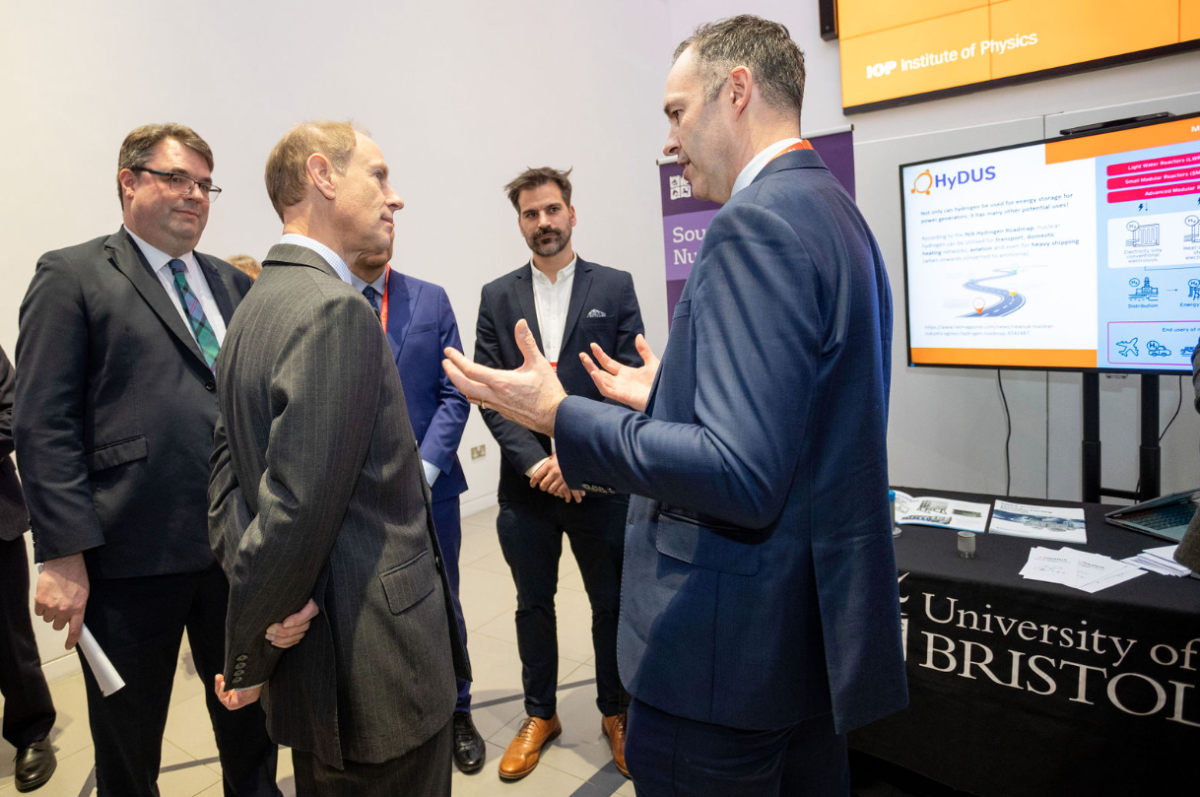The Duke of Edinburgh meets Bristol academic at prestigious gathering of physics experts
His Royal Highness the Duke of Edinburgh was invited to meet with Institute of Physics (IoP) members from academia and business to discuss physics’ role in the green economy.

The Duke of Edinburgh with Professor Tom Scott
Image credit: Institute of Physics
Tom Scott, Professor in Materials at the University of Bristol’s School of Physics, was there to greet the Duke to launch the output of the ‘Physics Powering the Green Economy’ project which he co-authored.
This was the IoP’s flagship 2023 project which aimed at shaping the debate with the STEM community by highlighting how physics has enabled the green economy of today, and setting out how physics can enable the green economy of tomorrow.
The arising report sets out the central role that physics innovation and physicists have played in realising the green economy of today, and the equally key part they will need to play in scaling up a sustainable, internationally competitive green economy in the UK and Ireland for the future – in particular as a ‘systems challenge’ how the skills that physicists have, and their way of thinking, is important in solving such a problem.
The report suggests that targeted support is provided for physics research and development, and business innovation, as part of a long-term systems approach to leadership, coordination and delivery to unlock more of the contribution physics can make, to support a thriving green economy in the UK and Ireland.
The Duke met with some of the UK’s leading physics-powered businesses and organisations involved with the shift to more sustainable energy generation and industry.
He also heard a presentation on the hydrogen storage project, HyDUS, delivered by Professor Scott, as part of a session on disruptive innovation
Professor Scott said: “This was a very special opportunity to showcase our game changing hydrogen storage technology to both royalty and interested industrial parties. Technology innovation and upscaling is a key necessity for the UK and other countries to achieve a green energy transition and we are proud to be doing our part at the University of Bristol.
“Energy storage is currently a relatively weak point for the UK’s future energy plans. With hydrogen looking to become one of the key energy sources of the future, we need to quickly develop and upscale technologies for its bulk storage and utilisation.
“We were honoured to have met HRH the Duke of Edinburgh who expressed great interest in the HyDUS Project.”
The IoP hopes and expects this community-led evidence will provide an important starting point for impact through a stronger voice for the physics community in relevant national strategies.
Tom Grinyer, the chief executive of the IoP and IoP President, Professor Sir Keith Burnett CBE welcomed His Royal Highness and thanked him for taking the time to meet with IoP members.
Commenting after the event Mr Grinyer said: “It was fantastic to have the opportunity to speak to his Royal Highness about the role physics and physicists are having in the green transition and the work the IoP has been doing on this issue. I know our members and partners who attended the event would like me to pass on my thanks to His Royal Highness for the time he spent with us today.”